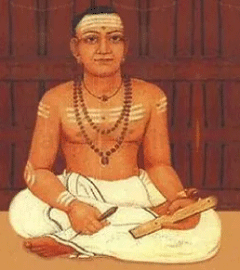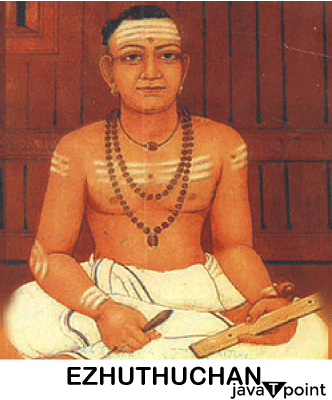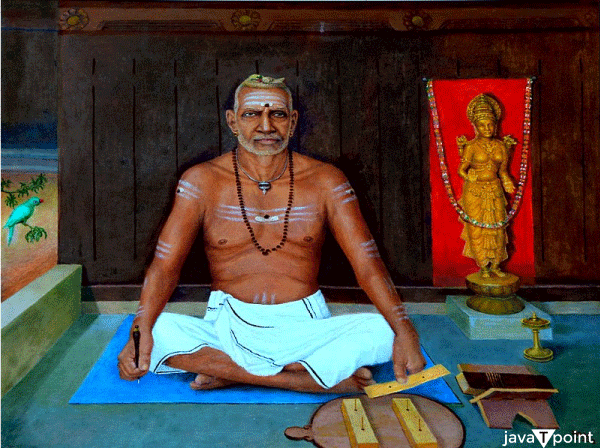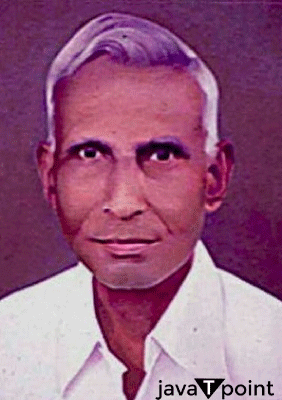Ezhuthachan

Introduction
Ezhuthachan, also known as Thunchaththu Ramanujan Ezhuthachan, was born in Trikkantiyur, modern-day Kerala, India, in the first half of the 16th century (about 1495-1550). He is also recognized as the "Father of the Malayalam language" and one of Kerala's most illustrious poets and intellectuals. Ezhuthachan was born into an orthodox Hindu household that is a part of the Namboothiri Brahmin community. As a result of his father's reputation as a teacher and scholar, Ezhuthachan was exposed to a scholarly and literary milieu at a young age.
Early Influences of Ezhuthachan
After seeing his son's potential, his father thoroughly educated him in languages, literature, philosophy, and religious texts. Ezhuthachan showed a strong desire to learn from an early age and swiftly mastered Sanskrit, the language of higher learning and literature at the time.
- Literary Quest
Ezhuthachan grew to appreciate poetry and literature intensely during childhood. He started writing poetry and rhymes in Sanskrit, displaying his extraordinary talent and originality. But he soon became aware of Sanskrit's limits in describing Kerala's ordinary people's daily lives and cultural ethos.
- Journey into Malayalam Literature
Ezhuthachan set out to establish an accessible literary tradition and script. He aimed to break away from Sanskrit's exclusivity and introduce literature to the Keralan people's native language, which is now known as Malayalam. The contemporary Malayalam alphabet was developed by Ezhuthachan, who also substantially contributed to its evolution and standardization. He added new letters and improved old ones to create a comprehensive and coherent script that could faithfully represent the sounds and nuances of the Malayalam language.
Ezhuthachan was a prolific writer and a poet in addition to his innovative work creating the Malayalam alphabet. He wrote several devotional and educational works, such as "Adhyatma Ramayanam" (the Ramayana in Malayalam), "Harinama Kirtanam" (a holy work), "Chinta Ratnam" and "Uthara Ramayanam". Because of his outstanding contributions to Kerala's literary and cultural scene, Ezhuthachan is held in high regard among Malayalam speakers. His dedication to making literature widely available and his essential contribution to the development of the Malayalam script have had a lasting impact on the history of the area and its language.
- Parentage and Birth of Ezhuthachan
Ezhuthachan, whose birth name was Thunchaththu Ramanujan Ezhuthachan, was born in the village of Trikkantiyur in the present-day Indian state of Kerala into a renowned Namboothiri Brahmin family. Though the precise year is not known with certainty, it is thought that he was born in the early 16th century. Ezhuthachan's early life was significantly shaped by his familial upbringing, which laid the groundwork for his academic interests.
- Namboothiri Brahmin Family
The Namboothiri Brahmins were a prominent and well-educated caste in Kerala. They were well known for their knowledge of Sanskrit and Vedic texts and were actively involved in the region's religious and cultural life. Ezhuthachan was raised in a setting that valued education and learning because his family came from a line of scholars.
- Kudiyirikkal Krishnan Ezhuthachan Influence
Ezhuthachan's father was a well-respected academic and educator in the neighborhood. He was essential in ensuring his son had an education and gained information. Ezhuthachan was taught by his in-depth knowledge of classical disciplines like Sanskrit grammar, literature, philosophy, and religious texts. The youthful Ezhuthachan was greatly influenced by Kudiyirikkal Krishnan Ezhuthachan's pursuit of knowledge and love of learning. His father's erudition and intellectual talks probably sparked Ezhuthachan's desire for knowledge and literary greatness.
Ezhuthachan's development as a scholar and poet started in this supportive home setting. The direction and instruction of his father prepared him for his eventual contributions to Malayalam literature and the creation of the Malayalam script. Ezhuthachan's intense passion for poetry and literature, along with his goal to make literature more accessible to the general public, eventually inspired him to investigate and develop the Malayalam script and forge a lasting reputation as the "Father of the Malayalam language." The critical foundation for his intellectual and artistic pursuits, which would influence Kerala's cultural and literary heritage for future generations, was his birth and upbringing in a learned Brahmin family.
Ezhuthacha1n's Education
Ezhuthachan's childhood was spent in the tranquil village of Trikkandiyoor in Kerala's Malabar area in modern-day India. Ezhuthachan was raised in a Namboothiri Brahmin family in a community renowned for its cultural diversity and rich tradition, religion, and education.
- Early Sanskrit Education
Ezhuthachan displayed a remarkable talent for learning at a young age. He started his education in Sanskrit, the language of study and literature at the time, under the direction of his father, Madhava Panicker. A thorough Brahminical education included studying classical books, grammar, and different disciplines of philosophy, which Ezhuthachan also did.
- Love of Poetry and Literature
When Ezhuthachan was young, he became very interested in poetry and literature. He demonstrated a natural talent for poetry writing and a profound love of literature. He would eventually make significant contributions to Malayalam literature due to his exposure to the deep poetic traditions of Sanskrit literature.
- The Pursuit of Accessibility and Inclusivity
Despite his fluency in Sanskrit, Ezhuthachan was aware of the language's limits in conveying Kerala's commoners' cultural ethos and way of life. He was driven to find a way to make literature more approachable for the general public and to bring it closer to their hearts. Finding appropriate works in the ordinary tongue that could convey the profound concepts and wisdom in the Sanskrit writings presented difficulties for Ezhuthachan. He undertook the challenging task of developing a script and literary tradition that would be more inclusive and understandable to ordinary people due to the shortage of accessible literature in the native tongue.
- Journey Toward Malayalam Literature
Ezhuthachan embarked on a transformative journey toward Malayalam literature to change the literary scene. To make Sanskrit literature more widely available, he tried to translate its richness into the local vernacular language. Ezhuthachan's dedication to this goal would later inspire him to develop the present Malayalam script and write several literary works that would take Malayalam literature to new heights. His substantial contributions to literature, language, and culture in the area were shaped by his early experiences and his commitment to his ideals. Ezhuthachan's contributions would ultimately influence Malayalam literature and establish him as a significant author and cultural figure in Kerala's history.
Early Writings and Literary Influences
Literary Influences
Ezhuthachan's father and other knowledgeable scholars guided his early exposure to Sanskrit literature, significantly affecting his literary growth. He read classical Sanskrit literature, such as the Mahabharata and Ramayana epics, as well as ancient writings and philosophical treatises. Due to these literary influences, he deeply respected the depth and profundity of Sanskrit poetry.

Ezhuthachan was influenced by Sanskrit literature, Keralan folklore, and oral storytelling. He saw the elegance and value of using vocabulary to portray ordinary people's wisdom and cultural heritage. This impact encouraged him to investigate the potential of Malayalam as a literary expression language.
Early Writings
While still in childhood, Ezhuthachan experimented with composing Malayalam poetry and verses. While he was still honing his craft as a poet, his early writings demonstrated his extraordinary brilliance and ingenuity. He tried to translate the grandeur of Sanskrit poetry into the native tongue so that ordinary people could understand and relate to it. The "Harinama Kirtanam," a devotional song devoted to Lord Krishna, was one of his early works of note. The piece displayed his command of poetic language and his capacity to communicate spiritual concepts to a broad audience. Early writings by Ezhuthachan revealed his strong spiritual leanings and love for God. He found inspiration in both the Sanskrit and Malayalam traditions' rich mythology and religious topics. In addition to being artistically attractive, his compositions frequently expressed moral and ethical principles, making them essential to society.
His study of Malayalam poetry served as a springboard for his later efforts to develop the contemporary Malayalam script. He saw the need for a thorough and uniform script that could faithfully capture the intricacies and sounds of the language. Ezhuthachan's writings became increasingly well-liked among Keralans as he worked to improve his literary voice and vision. His efforts to incorporate classical themes with the local language helped contemporary Malayalam literature to flourish, garnering him the moniker "Father of the Malayalam language." Early writings by Ezhuthachan, as well as his profound respect for both Sanskrit and Malayalam literature, were essential in establishing his legacy as a visionary poet, scholar, and linguist who would later revolutionize Malayalam literature and leave an enduring imprint on Kerala's cultural heritage.
The Path to Become Ezhuthachan
The development of Thunchaththu Ramanujan Ezhuthachan into the well-known literary character referred to as "Ezhuthachan" (meaning "the teacher who taught the alphabet") is a tale of tenacity, ingenuity, and the quest to make literature approachable to the general public.
- Early Education and Sanskrit Learning
Ezhuthachan received a typical Brahminical education from his father, Madhava Panicker, who was born into a Namboothiri Brahmin household in Trikkantiyur, Kerala. He immersed himself in studying Sanskrit, picking up the language's grammar, classical writings, and various philosophical writings. This grounding would significantly influence his literary career in Sanskrit literature. Despite his competence in Sanskrit, Ezhuthachan understood that the language was difficult to learn, and it fell short of expressing the ordinary people of Kerala's way of life and cultural ethos. He was brought to tears by the absence of literature in the native tongue that could convey the profound concepts and sage advice found in the Sanskrit writings.
- Pioneering Vision
Ezhuthachan embarked on a trailblazing mission to make literature more accessible and relevant to the general public. He saw a time when the richness of Sanskrit literature could be translated into the local tongue and expressed, making it more readily available to people who did not know Sanskrit. Ezhuthachan created the contemporary Malayalam script to make literature more approachable. He added new letters and improved old ones to produce a unified and thorough script that faithfully captured the intricacies and sounds of the Malayalam language. The way literature was written and read in Kerala will change dramatically due to this fantastic accomplishment.
- Writing in Malayalam
Armed with the newly developed Malayalam script, Ezhuthachan started writing literary works in the regional tongue. He concentrated on making moral, ethical, and spiritual points in a way that the average person could understand. His early works, such as "Harinama Kirtanam," demonstrated his talent and ingenuity and helped him become well-liked by the general public.
- Respect and Legacy
As news of Ezhuthachan's literary accomplishments and his work to advance Malayalam as a literary language spread, the people of Kerala showed him the utmost respect and adoration. His commitment to education and learning and his drive to make Malayalam a classical language earned him the moniker "Ezhuthachan," which means "teacher who brought the alphabet to the people."
- Legacy
Ezhuthachan left a lasting impression on future generations, becoming legendary in Kerala's cultural history. His contributions to Malayalam literature and the creation of the script created the foundation for the expansion of the language and its literary traditions. Ezhuthachan continues to be regarded as a literary titan and a cultural icon, and his impact on Malayalam literature is undeniable.
Contributions to the Literature of Malayalam
The impact and breadth of Ezhuthachan's contributions to Malayalam literature are enormous. His innovative work and creative brilliance left a lasting impression on Kerala's language, literature, and cultural legacy. His significant contributions include the following:
- Development of the Malayalam Script
The contemporary Malayalam script is credited to Ezhuthachan, who is also credited with developing and perfecting it. To adequately depict the sounds and phonetics of the Malayalam language, he added new letters and changed old ones. His work on the script helped standardize the writing system, facilitating future generations' access to and use of it. Malayalam was not frequently utilized for literary purposes before Ezhuthachan, and most intellectual writings were written in Sanskrit. Ezhuthachan's Malayalam writings greatly aided the popularity of Malayalam as a language for literary expression. He showed that Malayalam was able to convey lofty concepts and noble subjects.

- Writings
Ezhuthachan's writings revealed his profound spirituality, moral principles, and social conscience. He wrote in various genres, including instructional lines, philosophical treatises, and devotional poems. His most well-known compositions include the "Adhyatma Ramayanam," "Harinama Kirtanam," "Bhagavatam," and "Iruchippattu."
- Epics and Scriptures Adaptation
Ezhuthachan's translations of the Ramayana and the Srimad Bhagavatam into Malayalam made these renowned epics more accessible to the general public. He spread the region's cultural history by recounting these stories in the local tongue, making the moral lessons and anecdotes understandable to a larger audience.
- Promotion of Moral and Ethical Values
Ezhuthachan's writings strongly emphasized moral and ethical values, extolling the virtues of kindness, justice, and modesty. His writings acted as moral guides, teaching important lessons and pointing individuals toward a moral course.
- Influence on Future Writers
Ezhuthachan's works helped Malayalam literature flourish. Future generations of writers were inspired by his outstanding literary accomplishments and dedication to the language to study and master Malayalam literature.
Modern Malayalam Alphabet Development
Thunchaththu Ramanujan Ezhuthachan, known as the "Father of the Malayalam language," is credited with pioneering work that led to the development of the contemporary Malayalam alphabet. The development and standardization of the script, which made Malayalam a written language able to convey the depth of literature and culture, were made possible because of Ezhuthachan's vision, ingenuity, and linguistic ability. The writing system in Kerala was based on the Grantha script, a variation of the Brahmi script used for writing Sanskrit before the present Malayalam script emerged. Accurate representation of the sounds and phonetics of the Malayalam language was complex with the Grantha script. This restriction was a big obstacle for individuals who wanted to write in the common tongue.
- Contributions of Ezhuthachan
Ezhuthachan saw the necessity for a screenplay that could faithfully capture Malayalam's distinctive tones and nuances. He created the contemporary Malayalam alphabet because he was determined to make literature available to everyone and to find a way to communicate Kerala's cultural essence.
- New Letters
Ezhuthachan added several new letters to the alphabet to represent certain Malayalam sounds missing from Grantha. With these new characters, the script's phonetic repertoire was widened, and a more accurate approximation of spoken Malayalam was made possible.
- Improvements to Old Letters
Ezhuthachan not only added new letters, but he also improved old ones. To distinguish between sounds previously expressed ambiguously, he changed the shapes and forms of some letters. This improvement improved the script's precision and clarity.
- Standardization
Ezhuthachan's efforts helped to make the Malayalam script uniform. His work made it simpler for individuals to read and write Malayalam by ensuring that sounds were consistently represented across various texts and geographical areas.
- Adaptation to Vernacular Themes
Ezhuthachan considered how the screenplay would be used to portray themes and ideas in the vernacular language when writing it. He created the script to be more suited to the phonetic characteristics of Malayalam words, allowing for the development of a richer story.

- Legacy and Influence
By aiding in the development of the modern Malayalam alphabet, Ezhuthachan provided the groundwork for expanding and developing Malayalam literature. Future writers and academics could express themselves in Malayalam with clarity and nuance because his script became the language's de facto writing system.
The present Malayalam script was developed by Ezhuthachan, whose visionary work is still praised and revered in Kerala. His contributions continue to be an essential component of the cultural and linguistic identity of the Malayalam-speaking people, and his legacy remains a monument to the transformational power of language and literature.
Impact on Society and Education
In Kerala, Thunchaththu Ramanujan Ezhuthachan had a significant and far-reaching impact on society and education. His contributions to the growth of Malayalam literature and language profoundly impacted the region's educational system and social structure. Here are some of the significant effects:
- Promotion of Vernacular Education
Ezhuthachan made significant contributions to the vernacular education movement by working to create the contemporary Malayalam script and make the language more widely used for literary expression. His efforts allowed for a sizable body of literature to be written in Malayalam, increasing the population's access to education.
- Enhancing Literacy and Reading Culture
Ezhuthachan's services helped Kerala's literacy rates rise by standardizing the Malayalam alphabet and making literature in the local tongue available. The accessibility of Malayalam literature stimulated readers from varied backgrounds to interact with various topics, promoting a culture of learning and intellectual curiosity.
- Cultural Identity and Pride
The people of Kerala developed a sense of cultural identity and pride due to Ezhuthachan's passion for the Malayalam language and literature. His initiatives to advance the regional tongue as a literary expression cultivated a sense of community among Malayalam speakers and strengthened regional identity.
- Knowledge Democratization
Before Ezhuthachan, education, and literary works were mainly reserved for the select few privileged individuals who had access to Sanskrit and the Grantha script. Ezhuthachan's contributions democratized knowledge by enabling a more extensive section of society to engage in literary and cultural life.
- Influence on Education System
Ezhuthachan's efforts shaped how language and literature were taught in Kerala's educational system. The incorporation of Malayalam as a topic in schools was made possible by the standardization of the Malayalam script, which helped to preserve and spread the language.
- Social Impact
Through his writings, Ezhuthachan promoted moral and ethical values and moral qualities like righteousness, love, and compassion. His writings encouraged people to consider their behavior and promoted social responsibility and ethical behavior.
|


 For Videos Join Our Youtube Channel: Join Now
For Videos Join Our Youtube Channel: Join Now











